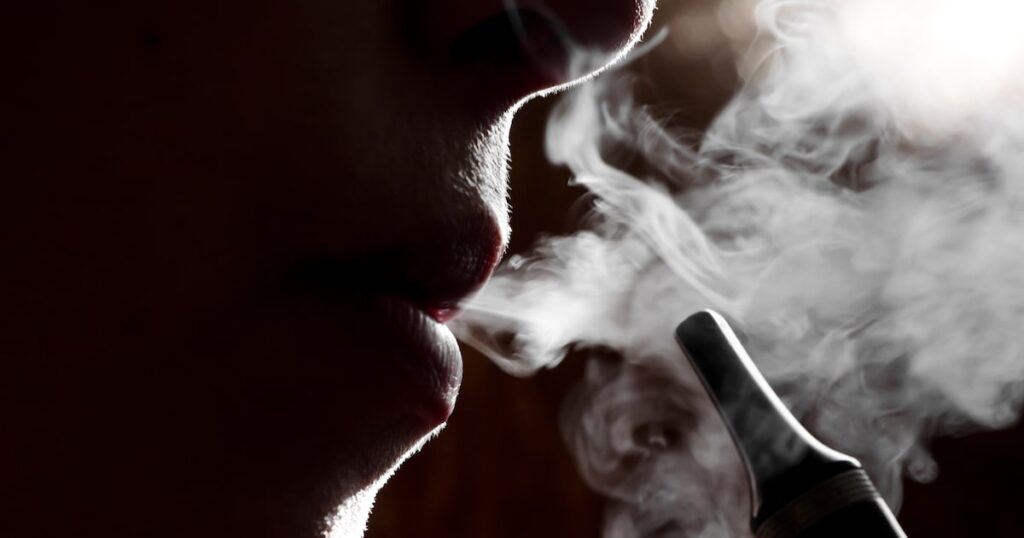For two years, Texas schools have taken a hard line on vaping: If students are caught with an e-cigarette on campus, state law requires them to be removed to a disciplinary alternative school.
What’s resulted is a spike in children kicked out of school and pushback from educators, politicians and public health officials.
Now state lawmakers are debating whether to ease up — or double down.
Vaping is a serious concern in schools, Wylie ISD chief of staff Jessica Branch told lawmakers during a Senate education committee meeting. But the strict punishment dictated during the last legislative session resulted in “unnecessary removals” to the off-campus Disciplinary Alternative Education Program, or DAEP.
“When students are removed from their classrooms, they lose valuable instruction time with their teachers of record, educators who know their learning styles, needs and goals,” she said.
Related:New vaping law lands hundreds of North Texas students in alternative school
E-cigarette offenses were the fourth most common reason that students were disciplined last year, with more than 32,000 violations, according to state data. Far more students were sent to DAEP last year than at any point in the past decade.
House Bill 6 — an expansive proposed rewrite of state discipline code — originally set out to eliminate the 2023 provision that made DAEP a mandatory punishment for vaping.
But members of the Senate seem less convinced than those in the lower chamber. An even stricter crackdown is proposed in a rewrite of the bill.
DAEP wouldn’t just be mandatory in such instances, but a loophole that allows districts to opt-out of the state discipline law would be eliminated under the version of the bill being debated by the Senate education committee.
Several schools have gotten around the vaping law because of the state’s “District of Innovation” system, which allows them to skirt certain rules. Most districts in the state are designated as District of Innovation, and some have used it specifically to avoid the DAEP mandate for vaping.
Houston ISD leaders, for example, built a District of Innovation plan specifying school officials can handle vaping at a student’s home campus, through counseling or other measures.
“Texas is diverse, and a one-size-fits-all mandate doesn’t always serve all of our communities. Local control would be much appreciated in this area,” Wylie ISD’s Branch said.
Sen. José Menéndez, D-San Antonio, called for “common sense flexibility,” specifically for young students and first-time offenders. He brought up the example of a child finding an older sibling’s vape pen and bringing it to school to show friends.
“That kid’s never been in trouble, and now our state law says … they’ve got to go to DAEP?” he said.
Students are generally sent to disciplinary alternative schools for serious offenses, such as making terroristic threats, selling drugs or assaulting an employee. The vaping mandate pushed some DAEP campuses to capacity.
Related:How Texas students, teachers could be impacted by a school discipline overhaul
Public health officials and juvenile justice advocates have expressed concern at the idea of disciplining children who likely need help with nicotine addiction. They’re calling for more educational and treatment resources for young people.
“Mandatory referrals fail to address the root cause of substance use and instead remove students from learning environments where they could possibly get help,” said Sarah Reyes, youth justice policy director at the Texas Center for Justice and Equity. “DAEPs are already overwhelmed with students removed for vaping.”
Sen. Charles Perry, the Lubbock Republican leading conversations about the bill in the Senate, said during a hearing last week that the Legislature is “working on the vape issue at multiple levels.”
For example, he authored a proposal that seeks to ban vape pens made to look like school supplies, cosmetics or toys.
With less than a month left in the session, lawmakers must hammer out differences between how the chambers want to approach school discipline reform — including when it comes to vaping.
“I think 99% of kids, when they see consequences, they usually change their ways a little bit,” Perry said. “But if they’re unfortunately already addicted, that’s a different conversation.”
Perry told colleagues he was open to conversations about the bill’s direction. He did not respond to a request for comment.
Related:Will it be easier to kick Texas’ littlest kids out of school? Lawmakers may weaken ban
The DMN Education Lab deepens the coverage and conversation about urgent education issues critical to the future of North Texas.
The DMN Education Lab is a community-funded journalism initiative, with support from Bobby and Lottye Lyle, Communities Foundation of Texas, The Dallas Foundation, Dallas Regional Chamber, Deedie Rose, Garrett and Cecilia Boone, Judy and Jim Gibbs, The Meadows Foundation, The Murrell Foundation, Ron and Phyllis Steinhart, Solutions Journalism Network, Southern Methodist University, Sydney Smith Hicks, and the University of Texas at Dallas. The Dallas Morning News retains full editorial control of the Education Lab’s journalism.


